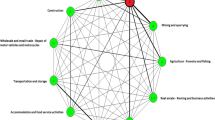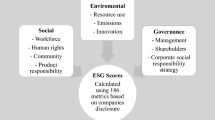Abstract
This paper explores the efficiency issue of the oil market in order to test the seasonal behavior of oil price returns, specifically day-of-the-week effect and month-of-the-year effect for the period December 1987 to January 2016. We use a dummy variable regression estimation technique to test seasonal anomalies for the Brent and WTI crude oil returns. Our empirical results find support for the negative Monday effect. The evidence of negative Monday returns is consistent with the relevant empirical literature. Moreover, the returns on Thursday are highest in a week followed by returns on Friday for both oil markets. This study also found evidence on month-of-the-year effect as the negative returns in November and December for Brent and WTI oil markets. Finally, this study is important for energy researchers, market participants, and policy-makers because anomalous oil markets’ behavior implies return predictability and the implementation of profitable investment strategies by market players and may also impact the macroeconomic variables and stock market returns.
Similar content being viewed by others
References
Abba Abdullahi S, Kouhy R, Muhammad Z (2014) Trading volume and return relationship in the crude oil futures markets. Stud Econ Finance 31(4):426–438
Agrawal A, Tandon K (1994) Anomalies or illusions? Evidence from stock markets in eighteen countries. J Int Money Finance 13(1):83–106
Auer BR (2014) Daily seasonality in crude oil returns and volatilities. Energy Econ 43:82–88
Ausloos M, Nedic O, Dekanski A (2016) Day of the week effect in paper submission/acceptance/rejection to/in/by peer review journals. Physica A 456:197–203
Ausloos M, Nedic O, Dekanski A, Mrowinski M, Fronczak P, Fronczak A (2017) Day of the week effect in paper submission/acceptance/rejection to/in/by peer review journals. II. An ARCH econometric-like modeling. Physica A 468:462–474
Balaban E, Bayar A, Kan ÖB (2001) Stock returns, seasonality and asymmetric conditional volatility in world equity markets. Appl Econ Lett 8(4):263–268
Bampinas G, Fountas S, Panagiotidis T (2016) The day-of-the-week effect is weak: evidence from the European real estate sector. J Econ Finance 40(3):549–567
Barros CP, Gil-Alana LA, Wanke P (2016) Energy production in Brazil: empirical facts based on persistence, seasonality and breaks. Energy Econ 54:88–95
Bell CM, Redelmeier DA (2001) Mortality among patients admitted to hospitals on weekends as compared with weekdays. N Engl J Med 345(9):663–668
Brooks C, Persand G (2001) Seasonality in Southeast Asian stock markets: some new evidence on day-of-the-week effects. Appl Econ Lett 8(3):155–158
Cabanac G, Hartley J (2013) Issues of work-life balance among JASIST authors and editors. J Am Soc Inform Sci Technol 64(10):2182–2186
Campos-Arceiz A, Koh LP, Primack RB (2013) Are conservation biologists working too hard? Biol Conserv 166:186–190
Chan KF, Treepongkaruna S, Brooks R, Gray S (2011) Asset market linkages: evidence from financial, commodity and real estate assets. J Bank Finance 35(6):1415–1426
Charles A, Darné O (2009) The efficiency of the crude oil markets: evidence from variance ratio tests. Energy Policy 37(11):4267–4272
Chatterjee A, Maniam B (1997) Market anomalies revisited. J Appl Bus Res 13(4):47
Cunado J, de Gracia FP (2014) Oil price shocks and stock market returns: evidence for some European countries. Energy Econ 42:365–377
Dessens J, Fraile R, Pont V, Sanchez JL (2001) Day-of-the-week variability of hail in southwestern France. Atmos Res 59:63–76
Doherty ST, Andrey JC, MacGregor C (1998) The situational risks of young drivers: the influence of passengers, time of day and day of week on accident rates. Accid Anal Prev 30(1):45–52
Driesprong G, Jacobsen B, Maat B (2008) Striking oil: another puzzle? J Financ Econ 89(2):307–327
Dubois M, Louvet P (1996) The day-of-the-week effect: the international evidence. J Bank Finance 20(9):1463–1484
Dzhabarov C, Ziemba WT (2010) Do seasonal anomalies still work? J Portf Manag 36(3):93–104
Dzhabarov CS, Ziemba WT (2012) Introduction—calendar anomalies. In Calendar anomalies and arbitrage, pp 1–81
Easterday KE, Sen PK (2016) Is the January effect rational? Insights from the accounting valuation model. Q Rev Econ Finance 59:168–185
Easterday KE, Sen PK, Stephan JA (2009) The persistence of the small firm/January effect: is it consistent with investors’ learning and arbitrage efforts? Q Rev Econ Finance 49(3):1172–1193
Ferderer JP (1996) Oil price volatility and the macroeconomy. J Macroecon 18(1):1–26
Flannery MJ, Protopapadakis AA (1988) From T-bills to common stocks: investigating the generality of intra-week return seasonality. J Finance 43(2):431–450
French KR (1980) Stock returns and the weekend effect. J Financ Econ 8(1):55–69
Gibbons MR, Hess P (1981) Day of the week effects and asset returns. J Bus 54:579–596
Gu AY (2015) The June phenomenon and the changing month of the year effect. Account Finance Res 4(3):1–8
Hartley J, Cabanac G (2017) What can new technology tell us about the reviewing process for journal submissions in BJET? Br J Edu Technol 48(1):212–220
Haug M, Hirschey M (2006) The January effect. Financ Anal J 62(5):78–88
Haugen RA, Lakonishok J (1987) Only in January. The incredible January effect: includes index. Dow Jones-Irwin, New York
Herteliu C, Ileanu BV, Ausloos M, Rotundo G (2015) Effect of religious rules on time of conception in Romania from 1905 to 2001. Hum Reprod 30(9):2202–2214
Huang RD, Masulis RW, Stoll HR (1996) Energy shocks and financial markets. J Futures Mark Futures Options Other Deriv Prod 16(1):1–27
Hussain F, Hamid K, Akash R, Khan M (2011) Day of the week effect and stock returns: (Evidence from Karachi Stock Exchange Pakistan). Far East J Psychol Bus 3(1):25–31
Jaffe J, Westerfield R (1985) The week-end effect in common stock returns: the international evidence. J Finance 40(2):433–454
Jaffe JF, Westerfield R, Ma C (1989) A twist on the Monday effect in stock prices: evidence from the US and foreign stock markets. J Bank Finance 13(4–5):641–650
Jiménez-Rodríguez R, Sánchez M (2005) Oil price shocks and real GDP growth: empirical evidence for some OECD countries. Appl Econ 37(2):201–228
Jones TL, Ligon JA (2009) The day of the week effect in IPO initial returns. Q Rev Econ Finance 49(1):110–127
Kamstra MJ, Kramer LA, Levi MD (2003) Winter blues: a SAD stock market cycle. Am Econ Rev 93(1):324–343
Kaneko T, Lee BS (1995) Relative importance of economic factors in the US and Japanese stock markets. J Jpn Int Econ 9(3):290–307
Keim DB (1983) Size-related anomalies and stock return seasonality: further empirical evidence. J Financ Econ 12(1):13–32
Khan MS, Scheule H, Wu E (2017) Funding liquidity and bank risk taking. J Bank Finance 82:203–216
Lakonishok J, Levi M (1982) Weekend effects on stock returns: a note. J Finance 37(3):883–889
Lakonishok J, Smidt S (1988) Are seasonal anomalies real? A ninety-year perspective. Rev Financ Stud 1(4):403–425
Lim SY, Mun Ho C, Dollery B (2010) An empirical analysis of calendar anomalies in the Malaysian stock market. Appl Financ Econ 20(3):255–264
Lucey BM, Pardo A (2005) Why investors should not be cautious about the academic approach to testing for stock market anomalies. Appl Financ Econ 15(3):165–171
Lucey BM, Tully E (2006) Seasonality, risk and return in daily COMEX gold and silver data 1982–2002. Appl Financ Econ 16(4):319–333
Maberly ED (1995) Eureka! Eureka! Discovery of the Monday effect belongs to the ancient scribes. Financ Anal J 51(5):10
Malkiel BG, Fama EF (1970) Efficient capital markets: a review of theory and empirical work. J Finance 25(2):383–417
Marr LC, Harley RA (2002) Modeling the effect of weekday-weekend differences in motor vehicle emissions on photochemical air pollution in central California. Environ Sci Technol 36(19):4099–4106
Mitra P, Khan GS (2014) An analysis of day-of-the-week and intraday effects in the Indian stock market: evidence from National Stock Exchange. J Contemp Issues Bus Res 3(3):115–127
Mohammadi H, Su L (2010) International evidence on crude oil price dynamics: applications of ARIMA–GARCH models. Energy Econ 32(5):1001–1008
Olowe RA (2010) Oil price volatility, global financial crisis and the month-of-the-year effect. Int J Bus Manag 5(11):156–170
Olson D, Mossman C, Chou NT (2015) The evolution of the weekend effect in US markets. Q Rev Econ Finance 58:56–63
Ono S (2011) Oil price shocks and stock markets in BRICs. Eur J Comp Econ 8(1):29–45
Park J, Ratti RA (2008) Oil price shocks and stock markets in the US and 13 European countries. Energy Econ 30(5):2587–2608
Perchanok K, Kakabadse NK (2013) Causes of market anomalies of crude oil calendar spreads: does theory of storage address the issue? Probl Perspect Manag 11(2):35–47
Pettengill GN, Buster DE (1994) Variation in return signs: announcements and the weekday anomaly. Q J Bus Econ 33:81–93
Regnier E (2007) Oil and energy price volatility. Energy Econ 29(3):405–427
Rodriguez KW (2012) Day of the week effect Latin American stock markets. Econ Anal Rev 27(1):71–89
Roll R (1983) Vas is das? The turn-of-the-year effect and the return premia of small firms. J Portf Manag 9:18–28
Rozeff MS, Kinney WR (1976) Capital market seasonality: the case of stock returns. J Financ Econ 3(4):379–402
Sadorsky P (1999) Oil price shocks and stock market activity. Energy Econ 21(5):449–469
Singleton JC, Wingender JR Jr (2003) The Monday effect: a disaggregation analysis. Q J Bus Econ 42(3–4):91–111
Stavárek D, Heryan T (2012) Day of the week effect in central European stock markets. E&M 4:134–146
Steeley JM (2001) A note on information seasonality and the disappearance of the weekend effect in the UK stock market. J Bank Finance 25(10):1941–1956
Stubbington T, Kantchev G (2016) Wall Street Journal. Retrieved from http://www.wsj.com/articles/oil-stocks-dance-the-bear-market-tango-1453722783
Tawadros G (2013) The cyclicality of the demand for crude oil: evidence from the OECD. J Econ Stud 40(6):704–719
Tevdovski D, Mihajlov M, Sazdovski I (2012) The day of the week effect in South Eastern Europe stock markets. Ann Econ Ser 3(3):20–24
Thaler RH (1987) Amomalies: the january effect. J Econ Perspect 1(1):197–201
Vazquez F, Federico P (2015) Bank funding structures and risk: evidence from the global financial crisis. J Bank Finance 61:1–14
Wachtel SB (1942) Certain observations on seasonal movements in stock prices. J Bus Univ Chic 15(2):184–193
Yergin D (2012a) How is energy remaking the world? Foreign Policy 194:60
Yergin D (2012b) US energy is changing the world again. Financial Times, p. 16
Yu HC, Shih T (2011) Gold, crude oil and the weekend effect: a probability distribution approach. Invest Manag Financ Innov 8(2):39–51
Zhu HM, Li R, Li S (2014) Modelling dynamic dependence between crude oil prices and Asia-Pacific stock market returns. Int Rev Econ Finance 29:208–223
Zhu H, Guo Y, You W (2015) An empirical research of crude oil price changes and stock market in China: evidence from the structural breaks and quantile regression. Appl Econ 47(56):6055–6074
Ziemba WT (2011) Investing in the turn-of-the-year effect. Financ Mark Portf Manag 25(4):455–472
Author information
Authors and Affiliations
Corresponding author
Ethics declarations
Conflict of interest
The authors declare that they have no conflict of interest.
Ethical approval
This article does not contain any studies with human participants or animals performed by any of the authors.
Additional information
Communicated by M. Squillante.
Publisher's Note
Springer Nature remains neutral with regard to jurisdictional claims in published maps and institutional affiliations.
Rights and permissions
About this article
Cite this article
Quayyoum, S., Khan, M.H., Shah, S.Z.A. et al. Seasonality in crude oil returns. Soft Comput 24, 13547–13556 (2020). https://doi.org/10.1007/s00500-019-04329-0
Published:
Issue Date:
DOI: https://doi.org/10.1007/s00500-019-04329-0




